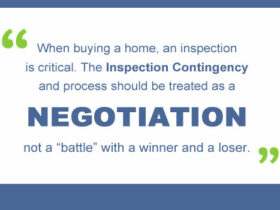Permits are necessary for a lot of things, and obtaining them before beginning a major home improvement project on a home may not seem to be a big deal. Many homeowners, however, end up with unpermitted work in their houses as a result of overlooking the importance of being compliant with local code ordinances.
There are several reasons why homeowners might decide to do home improvement projects without getting the required permits. As a result, many run into problems when they attempt to sell their house only to discover that major changes may be required in order to meet buyer demands.
Are you a buyer or a seller of a home with unpermitted improvements? Read on to learn what you may be able to do if you find yourself in this situation.
What is Unpermitted Work?
With residential structures, unpermitted work is the building or improving of a home without obtaining required permits from local governing bodies, usually cities. Some of the most common examples of unpermitted property improvements include room additions, large decks, patios, garages, swimming pools, and significant electrical repairs or updates.
Because permitting rules vary by location, what might need a permit in one place may not require one in another. And, each city is different in how strict they are with enforcement.
Why is Unpermitted Work a Problem?
It’s easy to assume that missing the appropriate permits is simply a paperwork issue, but frequently it’s more serious than that. Many contractors and handy homeowners fail to acquire the proper permits before beginning work for a variety of reasons. Fear of not being able to get or complete the work as required is one factor, and building permit costs are another.
Contractors who lack proper licensing may skip the permitting process because they do not want to get caught making low-quality or unsafe improvements. Others simply don’t want to deal with the hassle of working with the city.
Many homeowners who make improvements to their homes without the aid of a professional contractor may not be aware of the need for a permit, and this lack of awareness could also apply to current building codes.
Regardless of the cause or who was at fault, as a consequence, work that is not properly permitted and inspected may put both buyers and sellers at financial risk.
Can You Sell a House with Unpermitted Work?
Yes, homes with unpermitted work sell every day. However, many people are hesitant to buy a home with unpermitted improvements due to the potential risk of financial harm, so the value of these improvements will be lower.
The property may also be dangerous in some cases, as shoddy work can cause the home to not meet basic safety requirements. Further, unpermitted construction can make a property difficult or impossible to insure.
Bottom-line, most buyers will want a home that has been fully permitted and inspected, and they will pay more for it.
If your home has unpermitted work, you will need to disclose this information to potential buyers. This is most commonly done through a seller’s disclosure form. Of course, disclosing anything might result in purchasers offering thousands less than they would have otherwise. But, this is certainly better than risking the sale, or worse, being sued by the buyer after closing.
Seller: How to Handle Unpermitted Work When Selling
Document all Improvement Details
When a prospective home buyer discovers that certain parts of the property did not have the proper permits before construction, it becomes a fact-finding mission. It might take days, weeks, or even longer to discover what needs to be repaired and what does not. People should begin by examining the blueprints and making modifications from there. If a home’s original blueprints are missing, homeowners may need to approach their city or county for them.
Both buyers and sellers can search for permit records; real estate agents may offer to assist in the effort. Some municipalities keep this information public and accessible for decades. If there is no record for a construction permit, it may be best to presume the improvement is illegal. In order to begin mitigating the situation, they might need to document the condition and all elements of the house related to that project.
Request Retroactive Permits
In some cases, homeowners can apply for retroactive permits. Some cities allow this, but there are a lot of requirements people may not be able to meet.
It is fairly unlikely, but homeowners who had unpermitted work recently might want to try obtaining permits retroactively from the building or planning department. As a general rule, cities will not grant the permits unless they can see all aspects of the work and determine if it was completed appropriately because a city building inspector isn’t going to tear into walls or remove flooring to verify the work.
The cost of obtaining retroactive permitting will generally be more expensive than if the permit were taken out before beginning construction. The fees are meant to discourage people from working without permits, but they can also help fund the city’s efforts to crack down on unpermitted construction.
Before you apply for retroactive permits, you may want to get with a reputable contractor in advance who will examine the previous work and estimate the cost of repairs to bring it up to current code, as well as to get a better idea of how much of the work in-fact does meet code.
What are the requirements for a retroactive building permit?
Keeping in mind that all locations are different, generally, a retroactive building permit application is similar to a conventional one in that it allows the local building department to verify that the work satisfies all current codes.
Any drawings should be legible and created to accepted architectural standards. Besides drawings, your retroactive building permit application may require supporting documents, such as site plans, structural calculations, and electrical plans. Consult with your city’s building and permitting department to learn about all specific requirements.
Can you find the original builder or contractor? Although locating a builder from years ago may seem daunting, it might be a worthwhile effort. Your city or county usually has records for most permits ever issued, so you can request copies of every one filed by a particular company during a certain time period.
Remediating Unpermitted Work
If the work was done without a permit, it’s likely that portions weren’t completed to meet code. Without permits and proper inspection, work may have significant issues, possibly making the structure unsafe or causing a host of building quality issues. Even if the job appears to have been done correctly and safely, homeowners might still wish to pursue remediation. This means that it needs to be brought up to code before the home can be sold.
The cost of remediating unpermitted work varies greatly, depending on the scope of the project and how much needs to be done to make it up to code. This might be a significant expense, but the cost of eliminating code violations can be offset by selling for more money or reducing other costs associated with the house, not to mention, reducing potential liability in the future.
To remediate unpermitted work, homeowners usually need to hire a licensed contractor to remove all aspects of the unpermitted construction and install something in its place. Homeowners who are looking to sell soon and do not want to spend a lot of money should take care when considering DIY remediation because trying to fix the issues may create more unpermitted work.
Sellers Disclose Unpermitted Improvements – Always!
In most cases, unpermitted work becomes the biggest issue at selling time. Homeowners are bound by law to honestly describe the condition of the home. Unpermitted work represents a serious liability, especially if it compromises the condition of the house. While most situations are easily remediated, there are some cases that may be nearly impossible to resolve.
Therefore, homeowners should always disclose unpermitted renovations upfront when selling a home. If the buyers want to take on the task of remediating unpermitted home improvements, they can choose whether or not to go forward with buying the house.
As such, sellers should be prepared to outline the details of any unpermitted work, as well as records of their remediation efforts. Documenting all upgrades to the property creates a paper trail for prospective buyers to follow. It helps establish credibility and can also provide evidence sellers have met their obligations. It may also help mitigate any future liability for the seller.
Worried About Selling With Unpermitted Work?
Consider how you might promote your home to potential purchasers if you are concerned about selling a home with unapproved work. A good place to begin is by highlighting the presence of unpermitted construction, but there are a number of different methods to get your property noticed:
- Market your home to investors. A real estate investor may be looking for a property with some work that needs to be done. They can see this as an opportunity to get a good return on investment.
- Highlight the potential. If you have a partially finished basement that has unpermitted work, you could, for example, promote the property as having “great potential.” Unpermitted improvements can be seen as a positive, especially if it creates opportunities for buyers who can see their vision for the house.
- Offer a discount on the purchase price, or credit the buyer at closing. Instead of doing repairs yourself, offer a discount on the purchase price to make up for the additional costs of remediation. The future buyer will think they are saving money on the home and you won’t have to spend time completing repairs. And you may protect yourself from any future liability related to the repairs.
- Get reimbursed for the cost of the repairs. If you do end up hiring licensed contractors to do the repairs, be sure to keep all receipts and permits to show potential buyers. The cost of these improvements could be a significant added value compared to similar properties. This also shows transparency to buyers.
Seller Beware: Marketing Unpermitted Work May Be Ilegal
Even if the property has a popular feature, such as an in-ground swimming pool, homeowners are not permitted to advertise unpermitted renovations as a selling point. Even if the improvement is a highly desirable feature, without permits, they cannot be advertised. Sellers and their agents are not able to promote the feature in online advertising or even in a yard sign.
If the homeowner is caught marketing unpermitted work, they can be fined by their local municipality, and your real estate agent could also become liable. In some cases, this may also negate the sale of the property. It’s important for homeowners to be aware of these rules and to adhere to them when selling their home.
Buyer Beware: Risks When Buying a Home with Unpermitted Improvements
As a home buyer, you may fall in love with a property that has improvements where permits weren’t obtained. Is it necessary to cancel the transaction because of this? Certainly not. Buyers frequently purchase properties with unpermitted improvements. However, there are risks to doing so, such as:
- The work may not meet code. If the unpermitted work is discovered after you purchase the home, you may be required to bring it up to code. This can be a costly and time-consuming process.
- You may be responsible for future costs. Because the seller likely didn’t obtain permits for the work, they may not have completed it properly. This could mean that you are responsible for future repairs and/or fines related to the unpermitted work.
- You may not be able to get a mortgage. Most lenders will not finance a property that has unpermitted work, so you may have difficulty refinancing or selling down the road.
- The work may not be up to par. Even if the unpermitted work doesn’t cause any problems down the road, it may still be of a lower quality than permitted work. This can be a turn-off for future buyers and affect the value of your home.
- You will assume responsibility for the work with no permits. When you’re ready to sell your property, any unpermitted work must be disclosed to potential purchasers.
- Your neighbors may report the improvements. You anticipate your new neighbors will be wonderful, but that may not turn out to be the case, especially if they were disrupted by the construction. Disgruntled neighbors can become a thorn in your side.
- Your homeowner’s insurance may not cover certain claims. For example, if someone trips and is injured in an unpermitted addition, or if the home catches fire due to shoddy unpermitted electrical work, the insurance provider may refuse compensation.
- Mortgage companies might demand immediate loan repayment. Although this is unusual, it’s conceivable that if the lender discovers that you knowingly bought a property with an unlawful addition, they may demand the loan repayment at some point in the future.
Buyers: What to Do About Unpermitted Work
As a buyer of a home that has improvements where permits weren’t obtained, what are your options?
- You can continue with the purchase. If the deal seems reasonable enough, maybe it is worth it to you to move forward with the deal and accept the risks involved. You could always plan on correcting the issue later on. As long as you are willing to spend the money, you can usually get permits.
- You can negotiate further. Ask the seller to fix the problems. If the seller is giving a discount to sell as-is, chances are he or she is not interested in fixing the problem, and therefore may be willing to drop the price further.
- Terminate the contract. Simply find another home to buy. However, this assumes you are still in the inspection or option period, otherwise your earnest money may be at risk. If the issues associated with buying the home are too much for you to take on, then just keep looking.
Can a Buyer Sue a Previous Owner for Selling a Home With Unpermitted Work?
First and foremost, always seek legal advice from a real estate attorney! Do not use this article or anything else you read on the internet as fact, because every state has different laws, and every situation is unique.
That said, buyers may have legal recourse. There may be times when a buyer can sue the previous homeowner for unpermitted construction. If a seller intentionally withheld information about unpermitted work, it may be considered fraud and the buyer could have a legal claim in connection with the real estate transaction.
Always consult with an attorney. If you purchased the home and discovered issues after the sale, an attorney can walk you through each of the components you need to include when considering a case against the previous owner. These factors include repair costs, re-permitting fees, fines, and fees from the city.
Of course, the same can be said for a seller too. If you are a seller and are concerned about the potential risk of liability due to unpermitted repairs or improvements, then seek legal advice.
In Summary
Unpermitted construction is very common but also highly problematic, particularly when people start thinking about selling their home. By taking this information into account, homeowners can manage unpermitted home improvements in a way to minimize issues in the future, and homebuyers will know what to consider when buying a home with unpermitted work.




